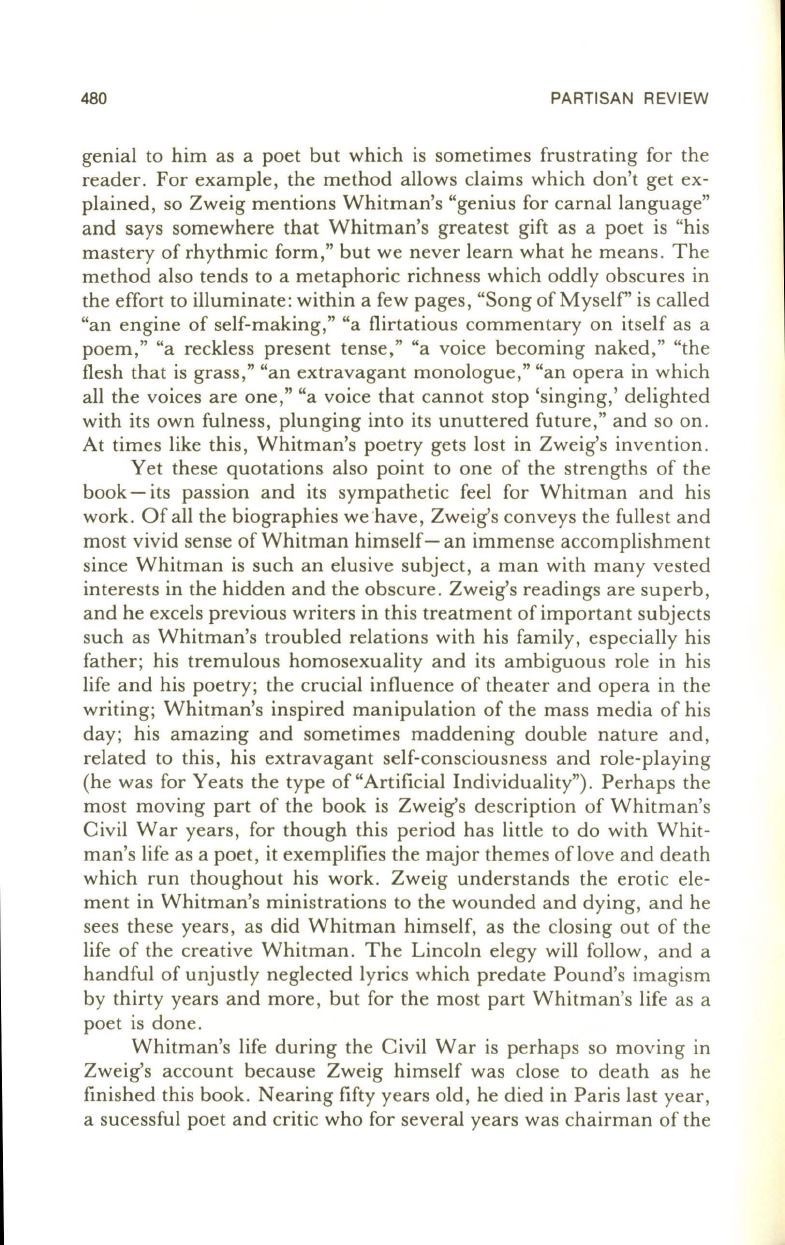
480
PARTISAN REVIEW
genial to him as a poet but which is sometimes frustrating for the
reader. For example, the method allows claims which don't get ex–
plained, so Zweig mentions Whitman's "genius for carnal language"
and says somewhere that Whitman's greatest gift as a poet is "his
mastery of rhythmic form," but we never learn what he means . The
method also tends to a metaphoric richness which oddly obscures in
the effort to illuminate: within a few pages, "Song of Myself' is called
"an engine of self-making," "a flirtatious commentary on itself as a
poem," "a reckless present tense," "a voice becoming naked," "the
flesh that is grass," "an extravagant monologue," "an opera in which
all the voices are one," "a voice that cannot stop 'singing,' delighted
with its own fulness, plunging into its unuttered future," and so on.
At times like this, Whitman's poetry gets lost in Zweig's invention.
Yet these quotations also point to one of the strengths of the
book - its passion and its sympathetic feel for Whitman and his
work. Of all the biographies we have, Zweig's conveys the fullest and
most vivid sense of Whitman himself-an immense accomplishment
since Whitman is such an elusive subject, a man with many vested
interests in the hidden and the obscure. Zweig's readings are superb,
and he excels previous writers in this treatment of important subjects
such as Whitman's troubled relations with his family, especially his
father; his tremulous homosexuality and its ambiguous role in his
life and his poetry; the crucial influence of theater and opera in the
writing; Whitman's inspired manipulation of the mass media of his
day; his amazing and sometimes maddening double nature and,
related to this, his extravagant self-consciousness and role-playing
(he was for Yeats the type of "Artificial Individuality"). Perhaps the
most moving part of the book is Zweig's description of Whitman's
Civil War years, for though this period has little to do with Whit–
man's life as a poet, it exemplifies the major themes of love and death
which run thoughout his work. Zweig understands the erotic ele–
ment in Whitman's ministrations to the wounded and dying, and he
sees these years, as did Whitman himself, as the closing out of the
life of the creative Whitman. The Lincoln elegy will follow, and a
handful of unjustly neglected lyrics which predate Pound's imagism
by thirty years and more, but for the most part Whitman's life as a
poet is done.
Whitman's life during the Civil War is perhaps so moving in
Zweig's account because Zweig himself was close to death as he
finished this book. Nearing fifty years old, he died in Paris last year,
a sucessful poet and critic who for several years was chairman of the


